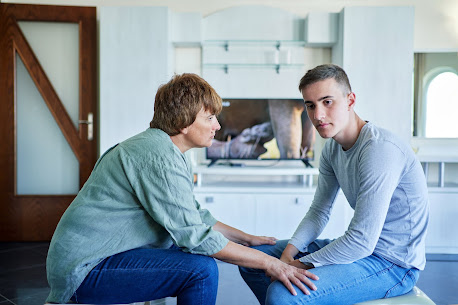Teens need to have some fun in the upcoming holidays but we want them to be safe: 'Age-appropriate monitoring' is vital
Of course, there are some parts of the country that have been comparatively COVID-free (e.g., WA, NT and Tasmania) and although there have been a number of disruptions and short lockdowns, for the most part, life did not change dramatically for teens living in those jurisdictions. It's important to remember, however, that no matter what their 'COVID experience', they have been watching one of the most challenging times in our history play out for the past 18 months. We're kidding ourselves if we think that the images of mass burial grounds in places like Brazil and India, trucks ferrying dead bodies across Manhattan, and the broadcasting of daily tallies of COVID cases and fatalities have not had some impact on our young people.
We do need to remember that young people, for the most part, are incredibly resilient and it is quite remarkable how they adapted to the situation thrust upon them. Studies have found, however, that depression, anxiety and self-harm are on the increase amongst our teens and there is concern that some could turn to alcohol and other drugs to 'self-medicate' in order to cope.
From my perspective it is the possible return of 'YOLO' that is just as concerning, particularly as we come to the end of the school year and the beginning of the traditional party season. I've discussed the #YOLO (You Only Live Once) phenomenon before but for those of you who don't know, YOLO is similar to 'carpe diem' ('seize the day') and is a call to live life to its fullest extent. Canadian rapper Drake used the term in 2011 and, as a result, it became a staple of music and youth culture. It then began to be used to accompany a range of increasingly dangerous stunts and pranks, culminating in Twitter suspending the use of the #YOLO in 2014 due to its link to the promotion of high-risk activity and, sadly, a number of deaths.
No-one's going to blame teens for wanting to 'blow off some steam' in the coming months. As I say to every group of students I present to - "We want you to have fun, you deserve it! But we want you to have a good time, not a dangerous time!" But when you combine potentially high-risk behaviour that goes along with 'letting your hair down' and parents who find themselves struggling to apply rules and boundaries around parties and alcohol (you want them to see their friends and have some fun as well) - the possible consequences are terrifying.
I've been working in this area for many years and I can't think of a time where I have been so worried about what could potentially lie ahead. I so hope I'm wrong and that our teens have a great time, look after themselves and each other and that they come out the other end unscathed. But realistically, unless we're incredibly lucky, the only way that is going to happen is if parents put a bit of effort into this as well ... I'm not asking much, just two simple things - be aware of what's coming and provide 'age-appropriate' monitoring.
Now this is not about 'helicopter parenting' – no-one's suggesting that you need to hover over your child and watch them every minute of every day. They need to be allowed to face life's hurdles and make mistakes, whether it be when they're playing in the back garden, walking with their friends to the local shopping centre or going to a party or gathering on a Saturday night. Those errors of judgment, silly decisions and bad choices that they're likely to make are how they learn to become fully-functioning adults.
But after a period of isolation and restrictions (that many teens have recently experienced), an uncertain and pretty gloomy world around them and the upcoming summer and holiday season, teen parties offer a very welcome 'light at the end of the tunnel' for many. They can also provide a 'perfect storm' where things can go terribly wrong, very quickly. Teens are surrounded by their peers, often at an event which host parents can find difficult to monitor, no matter what precautions they put into place and, as a result, a range of high-risk behaviours (e.g., alcohol and other drug use, sexual activity, driving and violence) are far more likely to occur.
Parties and gatherings are risky events at the best of times, it's vital that parents be aware that the risks are likely to be greater in the coming months. To help minimise these risks, do your best to monitor your teen. This is not about stopping them going and partying with their friends - they need to do that. Just ensure that you have some idea of what they're actually doing. Only you can make decisions in this area, but here are some things to consider:
- know where they are going and who they are going to be with
- take them to where they're supposedly going and pick them up
- agree on a curfew
- meet, or at the very least, talk to host parents of events your child is attending
- ask questions about alcohol and adult supervision to parents hosting parties your child is invited to
- ensure you do your homework around sleepovers. Do you know the parents? Will they be home? Is it a 'mixed sleepover'? Will there be supervision?
- have the name and contact number of at least one of their friends that they will be with when they go out
- monitor how much money they earn (or are given) and what they spend it on




Comments
Post a Comment